5 Things That Bothered Me About 'Star Trek Into Darkness'
After much anticipation, Star Trek Into Darkness is finally out this weekend. Peter and Germain have weighed in with their mostly-positive takes, and you guys have also chimed in with your thoughts. I personally enjoyed watching the movie from beginning to end, and got a kick out of seeing these characters come to life once more, as played by the immensely talented cast. It's a non-stop thrill-ride, a riveting experience that may leave you scratching your head at certain points, but never leaves you bored.
About those head-scratchers: yeah, this movie definitely made pretty bizarre decisions, several of which continued to nag at me days after I'd seen it, even though my overall memories of the film were ones of fondness. So, in the grand tradition, you'll find some of my issues after the jump. As always, feel free to respond with your own and/or correct me in the comments.
MASSIVE SPOILERS FOR STAR TREK INTO DARKNESS FOLLOW. 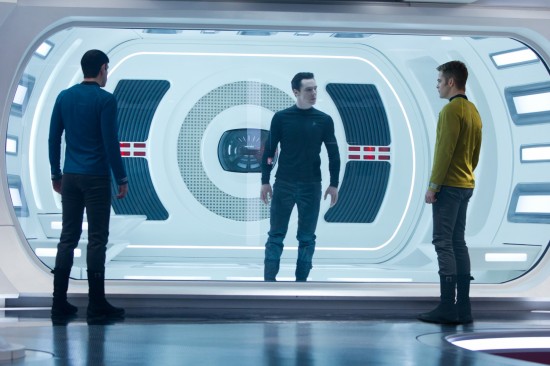 Khan - I will admit the following: Benedict Cumberbatch cuts a fine villain that just oozes with badassery, and there's nothing quite like watching a single dude take out a whole squad of Klingons (including their ships!). But pretty much nothing else about this character makes sense. Why would the Federation unfreeze one of the most skilled hand-to-hand killers in the history of mankind...to have him design futuristic weapons/technology? Why did he feel the need to rename himself John Harrison? How was his cryogenically frozen crew able to squeeze into those relatively small torpedoes? How effective of a reveal is it that he's Khan if he looks nothing like the Khan we've seen in the past, and his true mission is only referenced in passing at the end by Spock Prime?
Khan - I will admit the following: Benedict Cumberbatch cuts a fine villain that just oozes with badassery, and there's nothing quite like watching a single dude take out a whole squad of Klingons (including their ships!). But pretty much nothing else about this character makes sense. Why would the Federation unfreeze one of the most skilled hand-to-hand killers in the history of mankind...to have him design futuristic weapons/technology? Why did he feel the need to rename himself John Harrison? How was his cryogenically frozen crew able to squeeze into those relatively small torpedoes? How effective of a reveal is it that he's Khan if he looks nothing like the Khan we've seen in the past, and his true mission is only referenced in passing at the end by Spock Prime?
Abrams' Star Trek franchise has thus far been about reinvention. But where the first film stood on its own and incorporated references to previous incarnations brilliantly and organically, this film banks on our knowledge and appreciation of Khan from years past to lend weight to his motivations and actions. What's a shame is that there probably was a great film in here about a rogue agent determined to stop an out-of-control war-mongering Federation in the wake of Vulcan's destruction. The filmmakers could have struck out on their own into untrodden territory. But by invoking the Khan name, they automatically invite comparisons to The Wrath of Khan, and end up muddling the appreciation we had for that character.
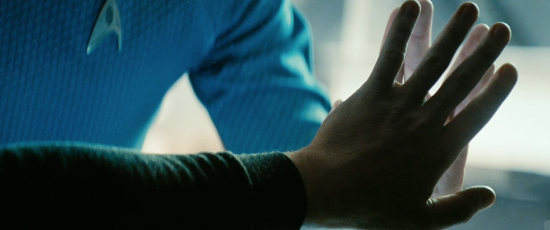 KHAAAAAAAAN! – There's an undeniable cleverness in the reversal of roles that takes place at the end of this film: where in Wrath of Khan, it was Spock who invoked the "needs of the many" idea, in this film, it is Kirk makes the ultimate sacrifice for his crew. It somewhat fits Kirk's arc better in this film, who begins this film as an arrogant, cocky bastard that needs to be brought back down to Earth (literally).
KHAAAAAAAAN! – There's an undeniable cleverness in the reversal of roles that takes place at the end of this film: where in Wrath of Khan, it was Spock who invoked the "needs of the many" idea, in this film, it is Kirk makes the ultimate sacrifice for his crew. It somewhat fits Kirk's arc better in this film, who begins this film as an arrogant, cocky bastard that needs to be brought back down to Earth (literally).
But while I love Quinto's incarnation of Spock, his "Khaaaan!" scream just felt kind of...silly? For a variety of reasons? Firstly, no one can do over-exaggerated screaming like William Shatner (whose scream in Wrath of Khan, if you think about it, was perhaps purposefully over-exaggerated to fool Khan. See this interview that Jordan Hoffman did with Nicholas Meyer for more details). Secondly, the reason that Spock's death was so gut-wrenching was because we'd gotten to know these characters, and their friendship, over the course of several seasons of television. Hell, we even survived Star Trek: The Motion Picture with them. In the universe of this franchise, their friendship has just begun making his angry reaction a bit less explicable.
I get that Spock's zen attitude towards death early on the film is meant to serve as a stark contrast to his freakout at the end. I just don't think it lands like it's supposed to.
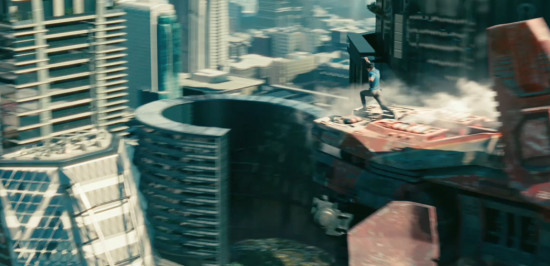 They cured death - What was so genius about the death of Spock in Wrath of Khan was the seeming finality of it. They killed off a major character an incredibly emotional way! It would be a couple years until The Search for Spock arrived and totally undid all of that interesting work. But in this film, Kirk was barely dead for 20 minutes before he was brought back to life by Khan's Lazarus blood.
They cured death - What was so genius about the death of Spock in Wrath of Khan was the seeming finality of it. They killed off a major character an incredibly emotional way! It would be a couple years until The Search for Spock arrived and totally undid all of that interesting work. But in this film, Kirk was barely dead for 20 minutes before he was brought back to life by Khan's Lazarus blood.
Put aside the fact that Bones had access to dozens of other superhumans in torpedoes all around him, who presumably each had their own version of life-giving blood, thus rendering the final chase sequence totally unnecessary. They were able to revive Kirk by injecting a Khan's blood into him! It's not taking chances if you kill a major character only to bring him back to life before the end of the film. It's the illusion of boldness. Furthermore, how can we trust that anything that takes place in this universe will continue to have stakes if a quick blood injection can potentially solve a character's brutal death?
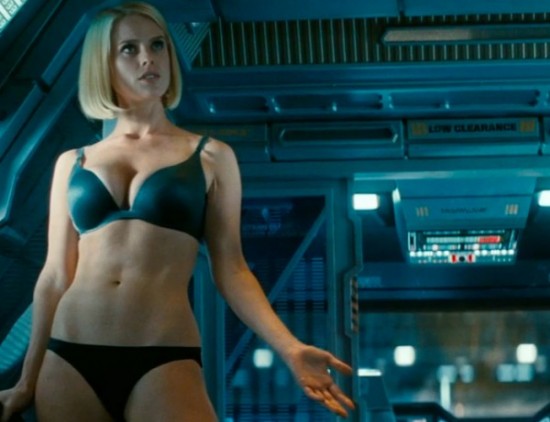 Carol Marcus - Okay, so Star Trek Into Darkness doesn't exactly pass the Bechedel Test. That's a bummer, but most movies don't these days. More bothersome is the fact that Carol Marcus is such a cypher of a character who has maybe a dozen lines during the course of the film, and who apparently exists only so a shot of her in her undies could be included in several ads for the film. Sure, she helps save the Enterprise at a critical juncture. But that's all she is – a plot point and a pretty face. Pretty shameless, and a wasted opportunity to shed more light on a character who was part of some critical plot points in the original series.
Carol Marcus - Okay, so Star Trek Into Darkness doesn't exactly pass the Bechedel Test. That's a bummer, but most movies don't these days. More bothersome is the fact that Carol Marcus is such a cypher of a character who has maybe a dozen lines during the course of the film, and who apparently exists only so a shot of her in her undies could be included in several ads for the film. Sure, she helps save the Enterprise at a critical juncture. But that's all she is – a plot point and a pretty face. Pretty shameless, and a wasted opportunity to shed more light on a character who was part of some critical plot points in the original series.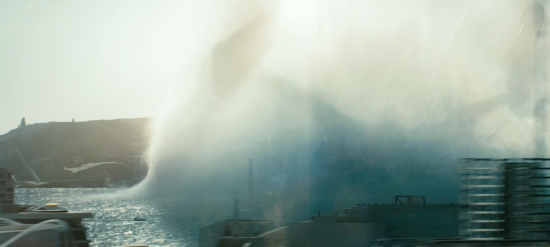 Earth has no missile defense system - It's well known that in the event that anyone should attempt an air-based attack on our capital in D.C., we have missile defenses and fighter jets that can scramble within minutes to meet the threat. Apparently the Federation of the future doesn't have anything comparable. In one of the climactic scenes of the film, Khan crashes his warship straight into San Francisco. It's a spectacular, breathtaking set piece, chock-full of pornographic futuristic destruction. It's also totally baffling that in the future, there's nothing in place to stop an enormous, hurtling object you can literally see from hundreds of miles away from wreaking untold amounts of destruction on a major city (Also strange: that such a cataclysmic attack is barely even acknowledged in the film's epilogue. If the Federation was freaking out and instigating war under false pretenses in the aftermath of Vulcan's demise, wouldn't a major attack on planet Earth that apparently killed thousands have an even more drastic effect?).
Earth has no missile defense system - It's well known that in the event that anyone should attempt an air-based attack on our capital in D.C., we have missile defenses and fighter jets that can scramble within minutes to meet the threat. Apparently the Federation of the future doesn't have anything comparable. In one of the climactic scenes of the film, Khan crashes his warship straight into San Francisco. It's a spectacular, breathtaking set piece, chock-full of pornographic futuristic destruction. It's also totally baffling that in the future, there's nothing in place to stop an enormous, hurtling object you can literally see from hundreds of miles away from wreaking untold amounts of destruction on a major city (Also strange: that such a cataclysmic attack is barely even acknowledged in the film's epilogue. If the Federation was freaking out and instigating war under false pretenses in the aftermath of Vulcan's demise, wouldn't a major attack on planet Earth that apparently killed thousands have an even more drastic effect?).
